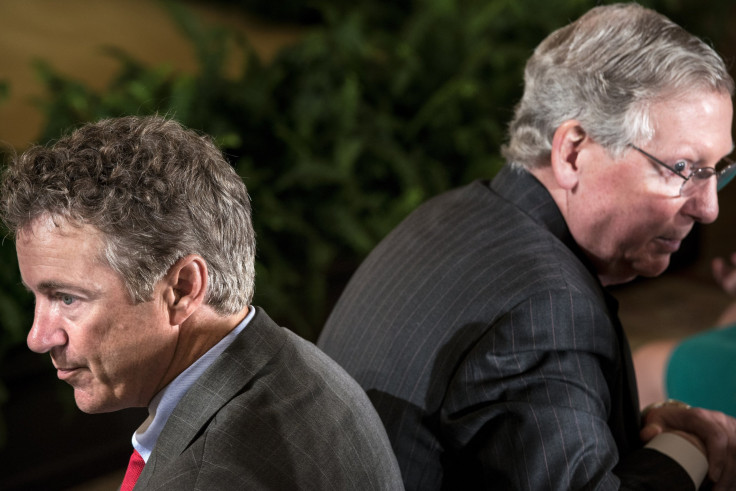Rand Paul vs. Mitch McConnell: US Senate Wrestles With Patriot Act Changes As Deadline Approaches

UPDATE 7:05 p.m. EDT: The Senate passed the 60-vote threshold to move forward on the USA Freedom Act. The vote was 77-17.
UPDATE 5:30 p.m. EDT: The Senate reconvened at 4 p.m. EDT Sunday to consider legislation that would allow U.S. spy agencies to keep collecting phone information and other records in their anti-terror efforts. Roll call votes were expected to begin at 6 p.m. EDT.
Original post:
The centerpiece of U.S. efforts to prevent terrorism at home was on the chopping block Sunday, as political factions in the Senate jockeyed for position. The USA Patriot Act, which allows the National Security Agency to collect cell phone data indiscriminately, is due to expire at midnight, and it appears legislation to prevent that from happening, or to modify the law, will be blocked.
Sen. Rand Paul, R-Ky., who is seeking the GOP presidential nomination, vowed Saturday to let the clock run out. He staged a filibuster last week against the law, which was passed in the wake of the Sept. 11, 2001, terrorist attacks in New York and Washington. The NSA's data collection practices were revealed by former NSA contractor Edward Snowden, triggering a political firestorm.
Paul, who espouse strong libertarian beliefs, said on his website that though he supports robust efforts to fight terrorists, "we do not need to give up who we are to defeat them."
The Senate has scheduled a rare Sunday session to deal with the measure. Senate Majority Leader Mitch McConnell, R-Ky., opposes any changes to the Patriot Act. The House, however, has modified the intelligence-gathering provisions to require a warrant for collection of cell phone data as part of the USA Freedom Act, which President Obama has endorsed.

Obama warned in his Saturday morning radio address that the expiration of the Patriot Act, without a substitute measure, could lead to a terrorist attack.
"This shouldn’t and can't be about politics. This is a matter of national security. Terrorists like al Qaeda and ISIL [the Islamic State group, also known as ISIS] aren’t suddenly going to stop plotting against us at midnight [Sunday]. And we shouldn’t surrender the tools that help keep us safe. It would be irresponsible. It would be reckless. And we shouldn’t allow it to happen," Obama said.
Unlike earlier incidents that saw the federal government lurching from crisis to crisis as a result of partisan bickering, the current standoff is among Republicans, who control both houses of Congress, the New York Times noted.
McConnell and his allies fear ending the bulk collection of data by the NSA under national security letters issued by the FBI will endanger national security. To mitigate those fears, the House and Senate Intelligence committees developed a series of options, including the authority to track "lone wolf" terror suspects not associated with a state sponsor and "roving" surveillance of a suspect rather than a phone number, the Times said.
Among the issues stalling the bill is whether technology can be developed quickly enough to enable phone companies to take over the storage of data so that when the NSA presents a warrant, the material can be turned over. The bill allows for a six-month transition but McConnell and Senate Intelligence Committee Chairman Richard Burr, R-N.C., doubt that's enough time, the Times said.
© Copyright IBTimes 2024. All rights reserved.






















